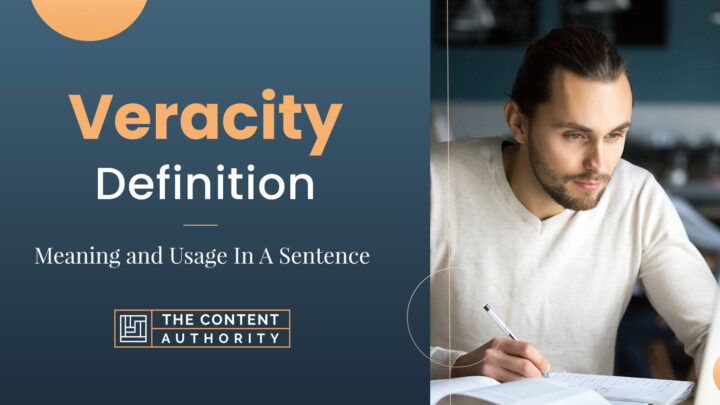One of the exciting virtues of the English language is the many unique words you discover whenever you are learning or listening to people speak. Among these new words is “veracity,” and if you are an avid reader or speaker, there is a chance you have heard of this word before. Take your time learning veracity definition, meaning, and sentence use to improve your grammar.
Veracity means “conformity with truth or accuracy”; it can also mean conformity to the truth or power to convey or perceive the truth. It is sometimes used in the scientific world to mean the ethical principle that governs how scientists carry out their research.
In addition to the word’s definition, you need to look at how it is used in sentences and take a deeper look into its background. It is only in doing so that you can understand the word in its totality, allowing you to use it in sentences without feeling like you are making a mistake. Read on to know all about the veracity and its uses.
 What is the Definition of Veracity?
What is the Definition of Veracity?
Veracity is a noun that means “complying with the truth or accuracy.” This definition allows the word to fit in different contexts. In almost every place, people are required to conform to certain specifications.
In all workplaces, there are rules to follow. You can use “veracity” to show adherence, but with honesty. Complying here doesn’t have to be forced on those required to follow the protocol. In most instances, it’s for their own good.
For instance, “The management was keen to inquire on Mark’s veracity in regard to the new surgery SOPs.” That means the interviewing management wanted to know whether Mark complies with surgery standard operating procedures during surgical operations.
Below are example sentences:
- Nancy is known for her veracity about her family background, which many aren’t open about.
- The lecturer’s favorite student is David; we all know it’s because he has shown veracity in Chemistry papers.
- Kelly’s veracity about the effects of technology on biochemical processes requires a Nobel Prize.
What is the Meaning of Veracity?
Veracity also means accuracy, truthfulness, or honesty when talking about a person’s character or the facts of a story. The word is considered a virtue that most people should have.
It acts as a guiding principle for carrying yourself and the information you give to others. Someone with veracity is trustworthy and dependable. They are the kind of people who can be trusted when giving an account of how things have run. Most of the time, their report or recollection of accounts and events will never be questioned. A person with veracity stands out in society.
Below are example sentences:
- Kim’s outstanding veracity attitude is what made the school respect her.
- Most large business enterprises take workers’ veracity very seriously in the workplace.
- Showcasing veracity in a compromising situation has never been easy; it requires integrity and truth.
Do People Still View Veracity as a Threat?
Like every other virtue, people with veracity were seen as snitches, and corrupt people would shun them. Over the years, however, this virtue has been embraced and appreciated widely. It is an attitude that many people work on emulating.
The initial argument people had with veracity was it was for people-pleasers who wanted to be liked by everyone. Now that more research has been done on people with veracity, it is obvious that anyone who possesses this quality says the truth, no matter the consequences. Such people are not afraid of speaking facts and will ensure that justice is served based on the truths they tell.
Is Veracity a Negative Word?
No veracity is not a negative word. When used in a sentence, it describes a desirable behavior. Something that is considered morally correct. Veracity stands for truthfulness, and anyone who possesses this trait is a moral person and sometimes a role model in society.
Society needs more people with veracity. They keep us on our toes and ensure we do what is right; they are like the moral police. People with veracity also lead straight lives and will come clean in case they do something wrong.
In a world where no one wants to own up to their mistakes, veracious people will help with accountability. Anyone working in the law and justice department needs to have this trait. That way, they can make all decisions based on the truth and will have the interest of people.
How to Use Veracity in a Sentence
Use this word as a noun to mean compliance with truth or facts. In various contexts, you can use the word veracious, which is the veracity adjective form. Synonyms of the word veracity are accuracy, authenticity, genuineness, honesty, and trustworthiness.
Here are some more ways you can use veracity in a sentence
- I am unable to ascertain the veracity of her story.
- Veracity is the most crucial character in the military.
- The veracity of your confession is what will set you free.
Veracious vs. Veracity
Most people get confused when it comes to the definition of veracious and veracity. While they all mean the same thing, there are some differences. Veracity is a noun and stands for the truth, while veracious is an adjective that stands for the act of truthfulness.
If a person has veracity, they are considered to be veracious. Here are some instances where the word veracious is used.
- His veracious behavior shocked everyone in the room.
- One thing that makes Seth a great mentor is her veracious heart and love for her mentees.
- She spoke in a veracious way that no one dared question her intentions right after.
10 Examples of Veracity in a Sentence
Learning how to use veracity in a sentence is very important. Here are some of the top examples of sentences that contain the word veracity. Learn from the example sentences, and try creating different sentences until you get it right. Here we go!
- No one could question the veracity of his actions; we all knew that he stands for truth.
- The judge released her based on the veracity of the witness account, despite spending three years in custody.
- The veracity of her essay writing is what got her into an Ivy League university.
- Mark practices veracity even at his workplace. It has made the work environment safer and more welcoming.
- The local federal police veracity could not allow her to take a bribe from a speeding motorist.
- Having veracity makes you a moral compass in society, something many people aren’t ready for, so move on and wish them godspeed.
- No one wants to work with someone who lacks veracity because that’s a threat to their job security.
- All researchers need to practice veracity, especially when dealing with human test subjects.
- “If there is one virtue I am glad I have, it has to be veracity,” The principal shouted confidently.
- Teaching your children about the importance of veracity makes them better people at a young age and future.
How Do You Spell Veracity?
The spelling of veracity is v-e-r-a-c-i-t-y.
How Do You Pronounce Veracity?
The American pronunciation of veracity is (vr.a.suh.tee) while the British pronunciation is (vuh.ra.suh.tee).
Whichever pronunciation you choose is okay; don’t worry too much because you pronounce it differently, especially in a written context. As long as you get the meaning and the spelling correct, you are good to go. However, in a spoken context, what matters most is embracing the pronunciation that your target audience understands to enable them to comprehend your speech with ease.
How Many Syllables Are In Veracity?
Veracity has four syllables; ve-ra-ci-ty.
The easiest way to pronounce a word is to figure out the number of syllables and stress parts. Once you learn that, then the rest will be easy to use.
History & Etymology of Veracity
The French initially used the word veracity in the 1620s as véracité. It comes from the Latin word veracitatem, which means truthfulness, and the Latin verax verus, which means truth. The word has undergone many adaptations and is now an English word that means being truthful and honest.
In learning about the word’s origin, you develop a newfound appreciation and respect for the word, and you can even use it better in your daily life. Understanding history also makes it easier to appreciate how far the language has come.
Veracity Synonyms
- Integrity
- Truthfulness
- Verity
- Honesty
Veracity Antonyms
- Dishonesty
- Mendacity
- Untruthfulness
- Deceit
 When Was Veracity First Used?
When Was Veracity First Used?
Veracity was first used in the 17th Century around the 1620s. After that, the use spread worldwide, and most people now embrace the word.
Conclusion
Now that you have learned about all there is to know about veracity; your grammar will improve. The veracity definition and examples in sentences will go a long way to help you figure out how to use the word in conversation and writing. We also hope you have also grasped the difference between the noun and the adjective forms of this word.
The best way to use this new word is through continuous practice. That allows you to figure out new ways to use the word and improve your English.
Shawn Manaher is the founder and CEO of The Content Authority. He’s one part content manager, one part writing ninja organizer, and two parts leader of top content creators. You don’t even want to know what he calls pancakes.

